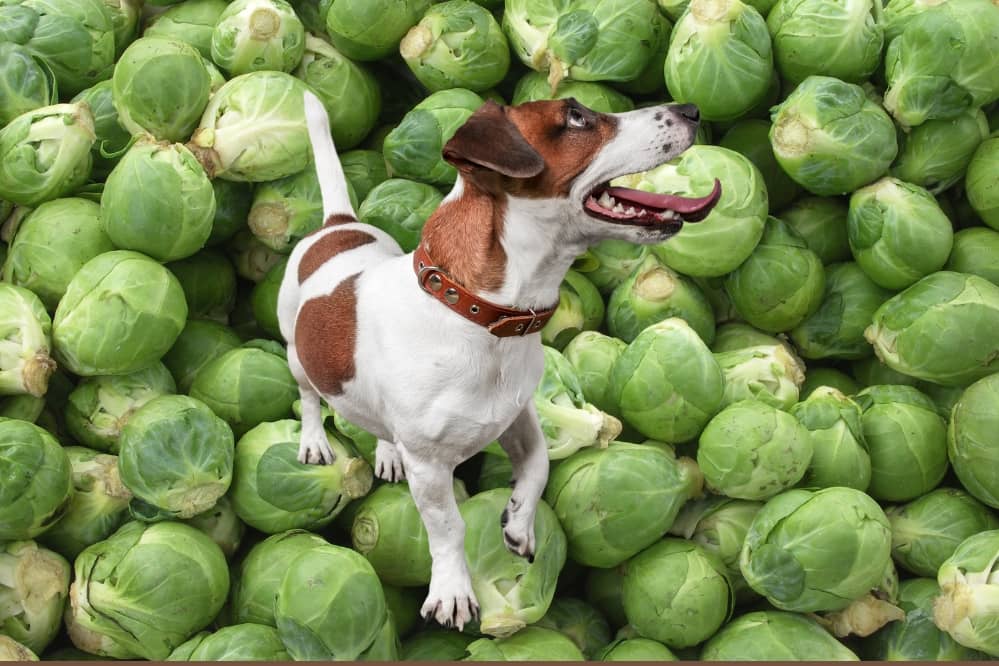Dogs are known to be omnivores, meaning they can consume both animal and plant-based foods. However, not all human foods are safe for dogs, and some may even be toxic to them. Brussels sprouts are a vegetable many humans enjoy, and you may wonder if it’s okay to share them with your pet. In this post, we will comprehensively discuss, “Can dogs eat Brussels sprouts?” and evaluate benefits and risks of including brussels sprouts in your dog’s diet plan.
What Are Brussels Sprouts?
Brussels sprouts are a type of cruciferous vegetable closely related to other vegetables like broccoli, cauliflower, and kale. They are small, green, leafy vegetables that resemble miniature cabbages and are a rich source of vitamins and minerals. With their low calorie count and high fiber content, they make a nutritious and healthy inclusion to any diet. In addition, Brussels sprouts are a popular vegetable in many cuisines around the world, and they have been cultivated for centuries.
Can Dogs Eat Brussels Sprouts? Or Are Brussels Sprouts Safe For Dogs To Eat?
Yes, Brussels sprouts are not toxic to dogs, and in moderation, they can be a healthy treat for your furry friend. However, it’s essential to remember that not all dogs have the same digestive system, and some may not tolerate brussels sprouts well. Also, dogs have different dietary needs than humans, so what is good for us may not be suitable for them.
How Often Can I Feed Brussels Sprouts To My Dogs?
The frequency at which you can feed Brussels sprouts to your dog depends on their size, individual dietary needs, and any underlying health conditions they may have. Brussels sprouts can be fed to dogs in moderation as an occasional treat or as part of a balanced diet. A standard guideline is that vegetables should account for a maximum of 10% of your dog’s daily caloric consumption.
Though most dogs can enjoy eating Brussels sprouts occasionally, monitoring your dog’s reaction to brussels sprouts and any other new foods you introduce into their diet is important. If you notice any signs of digestive upset, such as vomiting or diarrhea, or if your dog has difficulty digesting brussels sprouts, you should limit their intake or avoid feeding them to your dog altogether.
Therefore, it’s best to feed brussels sprouts to your dog in moderation and always consult your veterinarian before introducing any new food to your dog’s diet, especially if your dog has any underlying health conditions.
Benefits Of Feeding Brussels Sprouts To Dogs
Brussels sprouts are a nutrient-dense food that can offer several health benefits for dogs. Some common benefits of brussels sprouts are briefly discussed below.
High In Fiber
Brussels sprouts are an excellent fiber source, essential for maintaining healthy digestion in dogs. A diet high in fiber can help regulate bowel movements, prevent constipation, and reduce the risk of colon cancer. Additionally, fiber can help your dog feel full for longer, aiding in weight management and preventing overeating.
Rich In Vitamins And Minerals
Brussels sprouts are a nutrient-dense food rich in vitamins and minerals that are beneficial for dogs. They provide a significant amount of vitamin K, which plays a vital role in supporting bone health and aiding in blood clotting process. They are also high in vitamin C, which supports a healthy immune system and helps prevent cell damage. Additionally, Brussels sprouts are a good source of manganese, an important mineral for healthy bone growth and metabolism.
Antioxidant Properties
Brussels sprouts are high in antioxidants, which can help reduce inflammation in the body and support a healthy immune system. Antioxidants help prevent cell damage by neutralizing free radicals, which are unstable molecules that can cause oxidative stress and lead to chronic diseases. By incorporating brussels sprouts into your dog’s diet, you can help promote overall health and well-being.
Low In Calories
Brussels sprouts are low in calories, which makes them an excellent addition to any diet, especially for dogs that are overweight or obese. Replacing high-calorie treats with brussels sprouts can help your dog maintain a healthy weight and prevent obesity-related health issues.
Risks Of Feeding Brussels Sprouts To Dogs
While Brussels sprouts are generally safe for dogs to consume if fed in moderation, there are a few risks to be aware of (though these bad outcomes appear only when you feed brussels sprouts to your dog too often or in large amounts).
Digestive Upset
Since Brussels sprouts belong to the cruciferous family, these vegetables contain phytonutrients called isothiocyanates, which help intestinal muscles to move food and waste through the digestive tract. However, excessive consumption of brussels sprouts can lead to the buildup of bacteria (that helps in digestion by fermentation) in the digestive system. However, these tiny microorganisms produce a lot of gas. This can cause discomfort and stomach pain in dogs. Therefore, limiting your dog’s intake of brussels sprouts is important to prevent excessive gas production, which may result in unpleasant odors in your home.
Thyroid Problems
Brussels sprouts contain goitrogens, compounds that can interfere with thyroid function in dogs when consumed in large amounts. These compounds can lead to hypothyroidism, a condition where the thyroid gland does not produce enough hormones. This can cause lethargy, weight gain, and other health issues. Although it’s unlikely for your dog to develop such issues from consuming a small amount of brussels sprouts, it’s important to be mindful of this potential risk.
Choking Hazard
Brussels sprouts can pose a choking hazard, especially for small dogs or dogs that tend to gulp their food. To prevent choking, always cut brussels sprouts into small, bite-sized pieces before feeding them to your dog. Additionally, make sure to supervise your dog while they’re eating to ensure they don’t swallow large chunks of food.
Allergic Reactions
Some dogs may be allergic to brussels sprouts or other cruciferous vegetables, which can cause allergic reactions such as itching, hives, and digestive upset. If you notice any signs of an allergic reaction in your dog after feeding brussels sprouts, stop feeding immediately and consult with your veterinarian.
How To Feed Brussels Sprouts To Dogs
Brussels sprouts can be a nutritious and tasty addition to your dog’s diet when fed in moderation and prepared correctly. So, if you decide to feed brussels sprouts to your dog, it’s important to introduce them into your dog’s diet gradually. Start by feeding your dog small amounts of cooked brussels sprouts, and monitor their reaction. If your dog tolerates brussels sprouts well, you can incorporate them into their diet as a healthy treat or mix them with their regular food.
When feeding brussels sprouts, it’s important to avoid seasoning them with spices or herbs harmful to dogs, such as garlic or onion powder. Additionally, always make sure to cut brussels sprouts into small, bite-sized pieces to prevent choking and easier to digest for your dog.
Conclusion
In conclusion, brussels sprouts are a nutrient-dense vegetable that can be a healthy and tasty addition to your dog’s diet when prepared correctly and fed in moderation. Nonetheless, it is always advisable to seek advice from your veterinarian before introducing any new food into your dog’s nutritional plan. By incorporating brussels sprouts into your dog’s diet, you can help promote overall health and well-being.

